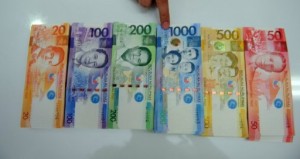IMF: Let peso rise vs dollar

The International Monetary Fund has urged Philippine monetary authorities to allow the peso to appreciate with the expected increase in the inflow of dollars this year. AFP PHOTO
The International Monetary Fund has urged Philippine monetary authorities to allow the peso to appreciate with the expected increase in the inflow of dollars this year and avoid measures to reverse market trend.
This is particularly if the foreign-exchange inflow would come in the form of foreign direct investments and an increase in remittances from overseas Filipinos.
“The exchange rate should move in line with structural flows,” Rachel Van Elkan, chief of the IMF mission to the Philippines, told reporters last week following the visit of IMF officials to assess the country’s economic conditions.
The IMF believed that efforts to keep currencies artificially weak or measures against currency appreciation have adverse consequences on the global economy.
Economists said efforts aimed at making currencies artificially weak cause the so-called “global imbalance.”
In particular, if emerging markets like the Philippines would make their currencies artificially weak and thus make their goods, labor and capital cheap, industrialized countries could further lose in the competition for exports and investments. Moreover, full recovery of industrialized countries could take much more time.
The IMF said the continued weakness in the advanced economies such as the United States and the eurozone could eventually have a more significant impact on emerging economies given the interrelation of economies.
Commonly criticized for making its currency artificially weak is China, which last year overtook Japan to become the world’s second-biggest economy after the United States.
Based on the IMF’s view, Van Elkan said the Bangko Sentral ng Pilipinas has so far not resorted to implementing measures aimed at reversing the trend of a rising peso.
The IMF said it would be prudent for the BSP to keep its current stance on the exchange rate amid an environment of rising foreign-exchange inflow.
“Policymakers [in the Philippines] have responded in a timely and flexible manner to the difficult global conditions. We commend the BSP for utilizing a variety of instruments to help insulate domestic monetary conditions from the abundant liquidity abroad,” Van Elkan said.
The peso, which closed at 41.05:$1 in end-2012, was the second-fastest appreciating Asian currency against the dollar last year.
BSP officials have said that the central bank would allow the peso to strengthen further against the dollar, but only if the appreciation pressures would be due to structural inflow like FDIs and remittances. Officials said, however, that the BSP would move against a potentially excessive rise in the value of the peso, saying too much volatility of the exchange rate was bad for the economy.
They also said the BSP would not tolerate appreciation pressures brought about by portfolio investments.
Some of the measures done by the BSP so far to avoid an excessive appreciation of the peso and to curb currency speculation were the imposition of a higher capital requirement on banks’ holdings of nondeliverable forwards (NDFs), setting a limit on banks’ NDF exposure; and prohibition of investing foreign funds in the BSP’s special deposit accounts.
